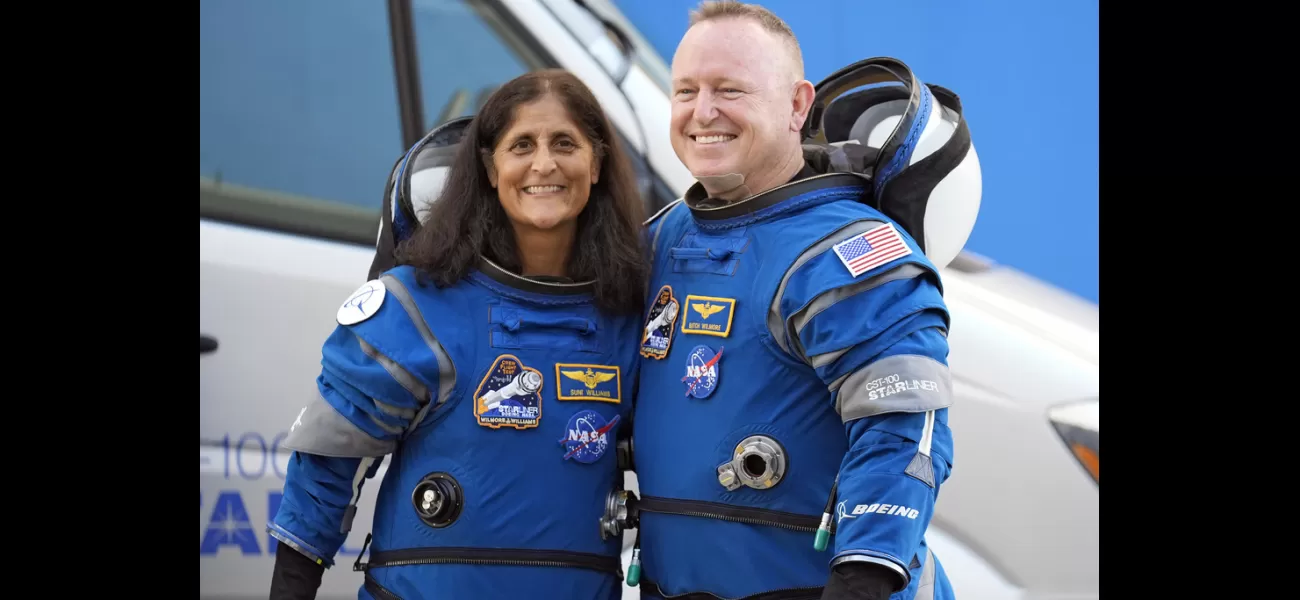Space travelers in peril, enduring physical and mental dangers while stranded.
When stuck in space, your body experiences certain changes.
August 23rd 2024.

Since Yuri Gagarin's historic journey into space in 1961, there have been a few unfortunate incidents related to space travel. It's no secret that sending humans into space is a risky endeavor. To prepare for the unique challenges of microgravity, astronauts undergo intense training and simulations to acclimate their bodies to weightlessness. Even with this preparation, spending extended periods in space can have a significant impact on the human body, affecting blood pressure, spatial orientation, balance, hand-eye coordination, and even bone density.
Recently, two American astronauts, Barry 'Butch' Wilmore and Sunita Williams, experienced unexpected complications while on a test mission to the International Space Station. They were launched into space on June 5th with the expectation of an eight-day stay, but now find themselves stuck indefinitely due to problems with their spacecraft, the Boeing Starliner. As NASA works to resolve the issues, Wilmore and Williams could potentially spend Christmas and New Year's at the space station, with the possibility of not returning to Earth until 2025. This prolonged time in space presents a new set of challenges for the astronauts, as their bodies will slowly but surely feel the effects of extended weightlessness.
Despite their extensive preparations, some side effects of space travel are impossible to avoid. NASA has reported that prolonged exposure to zero gravity can have a significant impact on bone health. Without the constant pull of Earth's gravity, the bones in the lower half of the body experience less stress and work, causing them to lose mineral density at a rate of 1 to 1.5 percent per month. If Wilmore and Williams are unable to return to Earth until February 2025, they could potentially lose up to 12 percent of their bone density, putting them at a higher risk for fractures and even osteoporosis.
In addition to bone loss, astronauts also experience decreases in blood volume and changes in heart rhythm while in space. These physical changes can have a significant impact on their overall health and well-being. But it's not just the body that is affected by prolonged space travel; it also takes a toll on the mind. The Centre for Space Medicine at the Baylor College of Medicine has noted that extended periods in space can have neurological effects on astronauts. Without the constant pull of gravity, the brain's signals to the muscles and internal organs can change, leading to disorientation, space motion sickness, and a loss of spatial awareness. These challenges can make even simple tasks difficult for astronauts in space, and they often require immediate rest and recovery upon returning to Earth.
Aside from the physical and neurological effects, astronauts also face other challenges while in space. Extended periods of weightlessness can cause changes in vision, including a condition known as Associate Neuro-ocular Syndrome, which can lead to swelling behind the eye. There is also a decrease in muscle mass, so astronauts must perform resistive exercises to maintain strength in their arms and legs. And like bones, teeth are also affected by weightlessness, as a loss of bone mass can occur in the teeth as well. NASA has strict guidelines in place to ensure the dental health of astronauts, including oral screenings for potential astronauts and the use of protective measures such as fillings, crowns, and bridges.
Another significant concern for astronauts in space is exposure to radiation. While on Earth, we are protected from harmful space radiation, but astronauts are at risk of being exposed to it beyond Low Earth Orbit. Prolonged exposure to radiation can lead to degenerative diseases and even cancer, making it a serious concern for those on long-term space missions. Currently, the best defense against radiation is limiting the amount of time astronauts spend in space, but NASA continues to research and develop new ways to protect astronauts from this danger.
So, what happens to the body after prolonged exposure to the weightless environment of space? Some effects may reverse upon returning to Earth, such as changes in vision and spatial orientation, but others may be permanent. It can take time for cognitive function to readjust to Earth's gravity, and studies have shown that bone density may never fully recover. Each astronaut's experience is unique, with some reporting difficulty walking and maintaining balance, while others have no trouble at all. It's a reminder that space travel affects each individual differently. But despite the physical and mental challenges that come with it, the opportunity to explore and push the boundaries of human knowledge and discovery is worth the risks.
As we continue to venture further into space, it's essential to understand the physical and psychological effects of prolonged space travel on the human body. Isolation, sleep disruptions, and cognitive dysfunction are just a few of the challenges astronauts face while on long-term missions. NASA is actively researching ways to mitigate these risks, such as providing virtual environments for exercise and giving astronauts the opportunity to learn a new language. As we continue to push the boundaries of space exploration, it's crucial to prioritize the health and well-being of our space travelers.
Recently, two American astronauts, Barry 'Butch' Wilmore and Sunita Williams, experienced unexpected complications while on a test mission to the International Space Station. They were launched into space on June 5th with the expectation of an eight-day stay, but now find themselves stuck indefinitely due to problems with their spacecraft, the Boeing Starliner. As NASA works to resolve the issues, Wilmore and Williams could potentially spend Christmas and New Year's at the space station, with the possibility of not returning to Earth until 2025. This prolonged time in space presents a new set of challenges for the astronauts, as their bodies will slowly but surely feel the effects of extended weightlessness.
Despite their extensive preparations, some side effects of space travel are impossible to avoid. NASA has reported that prolonged exposure to zero gravity can have a significant impact on bone health. Without the constant pull of Earth's gravity, the bones in the lower half of the body experience less stress and work, causing them to lose mineral density at a rate of 1 to 1.5 percent per month. If Wilmore and Williams are unable to return to Earth until February 2025, they could potentially lose up to 12 percent of their bone density, putting them at a higher risk for fractures and even osteoporosis.
In addition to bone loss, astronauts also experience decreases in blood volume and changes in heart rhythm while in space. These physical changes can have a significant impact on their overall health and well-being. But it's not just the body that is affected by prolonged space travel; it also takes a toll on the mind. The Centre for Space Medicine at the Baylor College of Medicine has noted that extended periods in space can have neurological effects on astronauts. Without the constant pull of gravity, the brain's signals to the muscles and internal organs can change, leading to disorientation, space motion sickness, and a loss of spatial awareness. These challenges can make even simple tasks difficult for astronauts in space, and they often require immediate rest and recovery upon returning to Earth.
Aside from the physical and neurological effects, astronauts also face other challenges while in space. Extended periods of weightlessness can cause changes in vision, including a condition known as Associate Neuro-ocular Syndrome, which can lead to swelling behind the eye. There is also a decrease in muscle mass, so astronauts must perform resistive exercises to maintain strength in their arms and legs. And like bones, teeth are also affected by weightlessness, as a loss of bone mass can occur in the teeth as well. NASA has strict guidelines in place to ensure the dental health of astronauts, including oral screenings for potential astronauts and the use of protective measures such as fillings, crowns, and bridges.
Another significant concern for astronauts in space is exposure to radiation. While on Earth, we are protected from harmful space radiation, but astronauts are at risk of being exposed to it beyond Low Earth Orbit. Prolonged exposure to radiation can lead to degenerative diseases and even cancer, making it a serious concern for those on long-term space missions. Currently, the best defense against radiation is limiting the amount of time astronauts spend in space, but NASA continues to research and develop new ways to protect astronauts from this danger.
So, what happens to the body after prolonged exposure to the weightless environment of space? Some effects may reverse upon returning to Earth, such as changes in vision and spatial orientation, but others may be permanent. It can take time for cognitive function to readjust to Earth's gravity, and studies have shown that bone density may never fully recover. Each astronaut's experience is unique, with some reporting difficulty walking and maintaining balance, while others have no trouble at all. It's a reminder that space travel affects each individual differently. But despite the physical and mental challenges that come with it, the opportunity to explore and push the boundaries of human knowledge and discovery is worth the risks.
As we continue to venture further into space, it's essential to understand the physical and psychological effects of prolonged space travel on the human body. Isolation, sleep disruptions, and cognitive dysfunction are just a few of the challenges astronauts face while on long-term missions. NASA is actively researching ways to mitigate these risks, such as providing virtual environments for exercise and giving astronauts the opportunity to learn a new language. As we continue to push the boundaries of space exploration, it's crucial to prioritize the health and well-being of our space travelers.
[This article has been trending online recently and has been generated with AI. Your feed is customized.]
[Generative AI is experimental.]
0
0
Submit Comment





